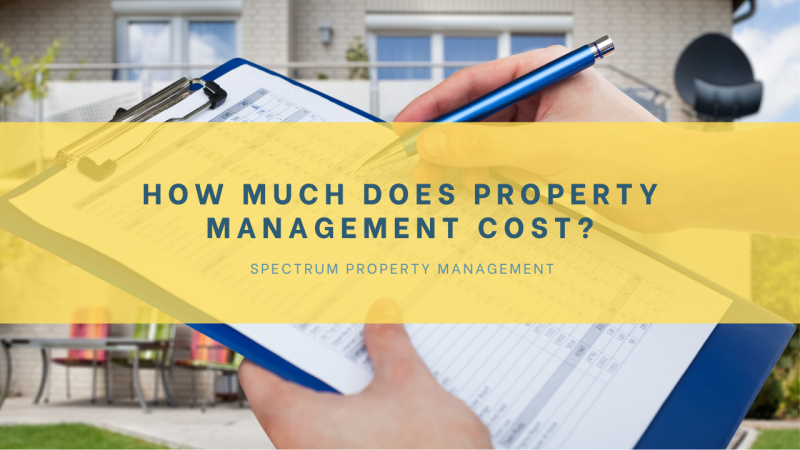How Much Does Property Management Cost?
Key Takeaways
-
Property management fees typically range from 7–10% of rent, plus setup, leasing, and renewal charges.
-
Costs cover valuable services like tenant placement, maintenance coordination, compliance, and financial reporting.
-
Spectrum Property Management helps landlords balance expenses with long-term savings, stability, and peace of mind.
Deciding whether to hire a property manager often comes down to one big question: how much will it cost?
For landlords, especially those balancing multiple units or managing other careers, property management fees can appear as another expense that eats into profits. But the reality is more nuanced. Behind the price tag lies a bundle of services that can protect your investment, stabilize your income, and save you countless hours of stress.
This guide from Spectrum Property Management breaks down the most common fees charged by property management companies, explains what they cover, and explores why the value often outweighs the cost.
HOW MUCH IS YOUR RENTAL WORTH?
BOOK A CONSULTATION TODAY.
Property Management Fees – What to Expect
The Setup Fee
When you first sign on with a property manager, you may be asked to pay a setup fee. This one-time charge covers administrative tasks like onboarding, document preparation, and account creation that enables you to rent out your house.
Think of it as the “opening act”, a small cost to establish systems that make everything else run smoothly.
The Ongoing Management Fee
The management fee is the backbone of the property manager’s compensation. Typically, it’s 7% to 10% of collected monthly rent, especially in larger metro areas. Owners with multiple units often receive discounts since economies of scale make management more efficient.
What does this fee usually include?
- Rent collection and deposits
- 24/7 maintenance coordination
- Tenant communication and customer service
- On-site visits for urgent issues
- Lease compliance oversight
- Monthly accounting and year-end financial statements
- Utility coordination and vendor invoicing
In other words, the management fee doesn’t just buy convenience, it buys infrastructure. A property manager becomes your operations team, financial back office, and tenant relations department, all in one.
Market-Based Variations
Not every market plays by the same rules. In high-rent cities, management fees as a percentage may be lower, since even a small percentage represents a healthy income for the company. Conversely, in smaller markets with lower rents, managers often charge on the higher end of the range to offset slimmer margins.
For landlords, the key is to calculate not just the percentage, but the value you’re receiving relative to your property’s rent and the local competition.
Leasing or Tenant Placement Fees
Finding the right tenant is one of the most valuable services a property manager provides, and it often comes with a leasing fee.
Here’s how the process typically unfolds:
- Walkthrough – The manager inspects the property, noting repairs or upgrades needed.
- Marketing – They photograph the unit, write a professional listing, and post across rental platforms.
- Pricing – They set a competitive rate based on location, amenities, and market demand.
- Screening – Applicants are vetted through credit checks, background reports, and rental references.
- Move-in coordination – Lease signing, deposits, and initial account setup are handled.
The leasing fee is usually collected only after the unit is rented. Some companies charge a flat rate, while others take a percentage of the first month’s rent.
A red flag? Firms that demand this payment upfront before doing the work.
HAVE A QUESTION?
ASK A PROPERTY MANAGER.
Lease Renewal Fees
The lease renewal fee covers administrative tasks like adjusting rent, updating terms, and preparing documents. While modest compared to placement fees, it ensures the renewal process is handled professionally and legally.
Maintenance Coordination and Markups
Repairs are inevitable. Some management firms add markups on vendor invoices to cover coordination. Other companies may handle small repairs internally or roll the cost into their management fee.
It’s important to ask upfront: Do they markup every repair? Do they require pre-approval for expenses over a certain threshold?
Understanding these details helps you budget realistically.
Annual Inspections
Many managers recommend annual property inspections. These visits confirm that the tenant is following lease terms and that no hidden maintenance issues are brewing.
Think of them as preventative care: a small cost now to avoid major repairs later.
Eviction Services
Evictions are rare but expensive. Some companies offer eviction protection as part of their package; others charge separately. A property manager can guide you through the process, ensuring all notices and filings are compliant to minimize delays and losses.
Vacancy Fees
Although uncommon, a few companies charge a vacancy fee if your unit sits empty. This is worth questioning if a manager is confident in their leasing ability, they should earn their fee once a tenant is in place.
What It All Adds Up To
On average, landlords spend $2,000 to $3,000 per property per year for management services. This includes the major fees outlined above, though your total will vary depending on unit count, property type, and market conditions.
Looking only at individual fees can be misleading. The smarter approach is to evaluate the total annual cost and weigh it against your rental income, time savings, and risk reduction. But not every benefit shows up on a balance sheet. Hiring a property manager delivers:
- Time savings
- Legal compliance
- Market expertise
- Peace of mind
Final Takeaway
Hiring a property manager comes with clear costs: setup, monthly management, leasing, renewals, inspections, and occasional legal fees. But when you zoom out, the average annual expense of $2,000 to $3,000 is often offset by higher rents, fewer vacancies, and greater tenant stability.
Property managers also help reduce legal risks, streamline operations, and strengthen tenant relationships, all of which safeguard your investment long term. For landlords who value their time, peace of mind, and long-term returns, property management is less an expense than an investment in efficiency and stability.
Let Spectrum Property Management handle the day-to-day while you focus on growth—contact us today to explore a property management plan tailored to your goals.
LET’S GET STARTED.
CONTACT US TODAY.



